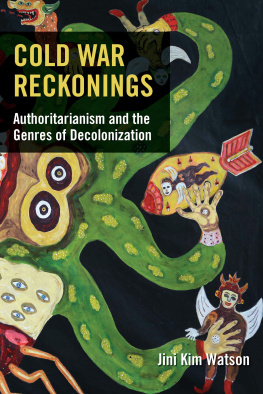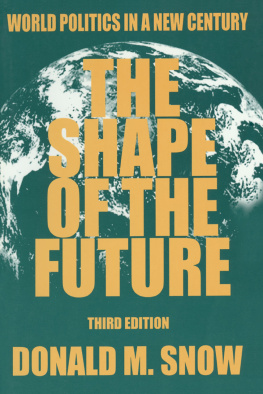Jini Kim Watson - Cold War Reckonings: Authoritarianism and the Genres of Decolonization
Here you can read online Jini Kim Watson - Cold War Reckonings: Authoritarianism and the Genres of Decolonization full text of the book (entire story) in english for free. Download pdf and epub, get meaning, cover and reviews about this ebook. City: New York, year: 2021, publisher: Fordham University Press, genre: Science. Description of the work, (preface) as well as reviews are available. Best literature library LitArk.com created for fans of good reading and offers a wide selection of genres:
Romance novel
Science fiction
Adventure
Detective
Science
History
Home and family
Prose
Art
Politics
Computer
Non-fiction
Religion
Business
Children
Humor
Choose a favorite category and find really read worthwhile books. Enjoy immersion in the world of imagination, feel the emotions of the characters or learn something new for yourself, make an fascinating discovery.
- Book:Cold War Reckonings: Authoritarianism and the Genres of Decolonization
- Author:
- Publisher:Fordham University Press
- Genre:
- Year:2021
- City:New York
- Rating:4 / 5
- Favourites:Add to favourites
- Your mark:
Cold War Reckonings: Authoritarianism and the Genres of Decolonization: summary, description and annotation
We offer to read an annotation, description, summary or preface (depends on what the author of the book "Cold War Reckonings: Authoritarianism and the Genres of Decolonization" wrote himself). If you haven't found the necessary information about the book — write in the comments, we will try to find it.
Honorable Mention, James Russell Lowell Prize, Modern Language Association
Honorable Mention, Ren Wellek Prize, American Comparative Literature Association
How did the Cold War shape culture and political power in decolonizing countries and give rise to authoritarian regimes in the so-called free world? Cold War Reckonings tells a new story about the Cold War and the global shift from colonialism to independent nation-states. Assembling a body of transpacific cultural works that speak to this historical conjuncture, Jini Kim Watson reveals autocracy to be not a deficient form of liberal democracy, but rather the result of Cold War entanglements with decolonization.
Focusing on East and Southeast Asia, the book scrutinizes cultural texts ranging from dissident poetry, fiction, and writers conference proceedings of the Cold War period, to more recent literature, graphic novels, and films that retrospectively look back to these decades with a critical eye. Paying particular attention to anti-communist repression and state infrastructures of violence, the book provides a richaccount of several U.S.allied Cold War regimes in the Asia Pacific, including the South Korean military dictatorship, Marcos rule in the Philippines, illiberal Singapore under Lee Kuan Yew, and Suhartos Indonesia.
Watsons book argues that the cultural forms and narrative techniques that emerged from the Cold War-decolonizing matrix offer new ways of comprehending these histories and connecting them to our present. The book advances our understanding of the global reverberations of the Cold War and its enduring influence on cultural and political formations in the Asia Pacific.
Cold War Reckonings is available from the publisher on an open-access basis.
Jini Kim Watson: author's other books
Who wrote Cold War Reckonings: Authoritarianism and the Genres of Decolonization? Find out the surname, the name of the author of the book and a list of all author's works by series.









